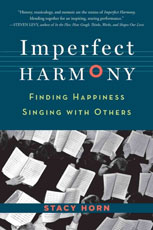" 'When you sing, you cannot be sad for long,' a chorister was quoted as saying in a British study of singing, and that seemed to be both my experience and that of the choir overall. There is a lot of science to support the universality of this response. Almost every study of singing I've read comes to the same conclusions: singing feels great and it's good for you. It decreases feelings of anxiety, loneliness, and depression. Singing also makes you smarter. Children who sing in choirs get better grades, according to a 2009 study by Chorus America. Choristers are also nicer. They were found to volunteer significantly more than the general public and to give more money to charity.
"There are physical benefits to singing, as well. Studies show that brain activity involved with learning music helps counteract the effects of aging and cognitive decline. In her book The Secret Life of the Grown-Up Brain, Barbara Strauch includes joining a choir as one of the things you can do to enhance neuroplasticity. Music increases gray matter and the number and strength of neural connections in the brain. My 100 percent score in the cognitive abilities test in her book may be attributable to a lifetime of continually learning new (and really hard) music. When archaeology professor Steven Mithen, a nonsinger, took singing lessons, it changed his brain after only one year.
"Singing relieves tension headaches and symptoms of irritable bowel syndrome. It helps people with asthma and bronchitis to breathe. It's 'particularly useful,' according to the authors of the paper 'The Therapeutic Effects of Singing in Neurological Disorders,' in ameliorating the effects of a variety of neurological disorders, including stuttering, Broca's aphasia, Parkinson's disease, and autism. Singing also reduces stress, which can aid in healing and can improve the immune response. People who listen to music before surgery are more relaxed and need less anesthesia, and afterward they get by with smaller amounts of pain medication. Music can calm our hearts or makes them race, lower our blood pressure or raise it. One study indicated that making music together actually reduced stress more than sitting back with a magazine or newspaper. Even singing about death is good for you. Researchers discovered that a choir singing Mozart's Requiem showed an increase in s-IgA, an immunoglobulin that enhances our immune defense.
"Everywhere I look I find confirmation that music is having a positive physical effect. It excites all the areas of the brain that have to do with emotion and emotional memory. It brings atrophied limbs back to life. People who can't remember information for more than a few seconds at a time can sing a long, complicated piece of music. Stroke victims who can barely speak can sing. People who can't talk at all can still sing. After being shot in the brain, Congresswoman Gabrielle Giffords learned to talk again by singing. Finally, when all other memories are gone, victims of Alzheimer's are still able to sing songs from their long-distant youth. Music is the last thing to go."
